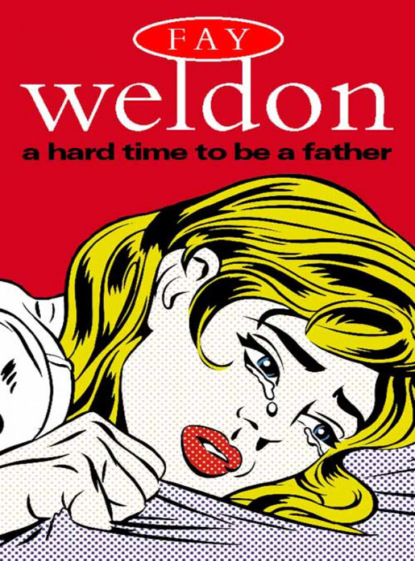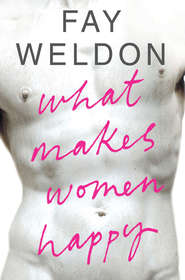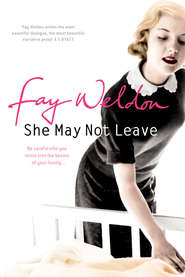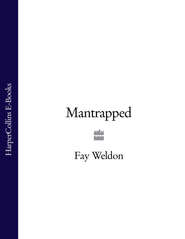По всем вопросам обращайтесь на: info@litportal.ru
(©) 2003-2024.
✖
A Hard Time to Be a Father
Автор
Год написания книги
2018
Настройки чтения
Размер шрифта
Высота строк
Поля
But Zelda’s lips and nostrils were blurring. She was hideous. Zelda dissolved and vanished in a scramble of snow. Josie pressed the alarm for the emergency technician. ‘Your fault has been automatically recorded,’ the stand-by screen flashed. ‘Please do not block emergency lines, OK?’ Josie clicked on OK, although it was far from okay. But what could you do? If you didn’t acknowledge OK, the screen pinged back at you interminably. She tried to click to No-Sound, but couldn’t. Was this what life was going to be like under Nex Control? Inefficient and ineffective? It was intolerable. Perhaps one hundred and thirty-two years of life was intolerable, full stop.
The whole point of age was the acquisition of wisdom: she could impart it, in haiku form, or in advice to the likes of Mandy Miller. But if Mandy Miller didn’t turn up, what use was Josie Toothpad? A silly name, given to her by a computer. Besides, she’d gone right off haiku: recently she’d developed a liking for romantic verse. She wanted to be in love again. If she couldn’t be in love she’d rather be dead. Right back in the beginning, she’d never wanted to live to be more than thirty. She’d outstayed her welcome by one hundred and two years.
How long since she’d ordered her doughnut? Six minutes? Delivery was meant to be within four. She’d complain, although that was a breach of good manners. The more reprehensible complaining was, the theory went, the more others would struggle to ensure no grounds for complaint existed. But Josie was allowed her eccentricities, being a pioneer. She called back D O N U T: @ revo.efil. ‘Fuck off,’ she entered, giggling. ‘Your comment has been recorded,’ said the screen. ‘Please be patient. OK?’ OK, Josie clicked, lying through her teeth.
The Friendship Screen bleeped. It was Honour, her friend. These days Honour seldom called. Honour had got caught up in the Occult ‘n Oracle network: Josie had denied the existence of the paranormal and Honour and Josie had quarrelled. Zelda had advised them against patching it up. The two friends, Zelda said, had clearly outworn each other, grown apart. Better to finish it now. It happened to Heaven-on-Earthers that friendships failed as the birthdays mounted up. There was always Zelda, for companionship and consolation. Zelda never fretted; Zelda always knew.
Honour on screen looked lovely; about fourteen years old. Red hair tumbled round perfect features. Before you enrolled as a Heaven-on-Earther, you had cosmetic surgery to perfect any flaws blind Mother Nature had inflicted upon you. Not for the sake of attracting men – there weren’t many around these days anyway: most who started male had foetal microsurgery and a dose of oestrogen three weeks into conception and ended up female, or roughly so – but for the sake of self-esteem, self-image. You had to be comfortable with yourself. It was a duty.
Josie squealed and all but leapt up and down to see her friend. Her feet, oddly, had some difficulty reaching the ground. Josie thought ‘but I’ve shrunk’. Nor was there much life in her legs, for all the voltage she’d put through her muscles over the years. She didn’t think she could get to the door. She just knew she didn’t want to stay in her chair, though the chair it was which wrapped her, soothed her, stroked her, made love to her, sung to her – all of a sudden Josie just wanted not to be in it, couldn’t bear to sit still a moment longer.
‘Josie, what am I going to do?’ asked Honour. ‘All my screens are on the blink, and Zelda’s gone mad. She keeps giving me advice I haven’t asked for. And I had an appointment at eleven a.m. with someone called Mandy Miller but she hasn’t turned up. And neither has the doughnut I ordered.’
‘Mine neither,’ said Josie. ‘But I know who I am and I’m perfect.’ It was their mantra from way back.
‘You look about twelve,’ said Honour to Josie. ‘And I’m not much better. I guess what they’re saying is true.’
‘Go on, tell,’ said Josie. ‘What are they saying?’
‘Nex Control upped our Ecstasy 3 last week and our age reversal is now irreversible,’ said Honour. ‘We’re all growing younger exponentially. Give us another fifteen minutes and we’ll return to the womb and lapse into a coma; then we’ll drift into nothingness; we’ll be unconceived; we will not have existed. Funny thing is, I don’t mind one bit.’
Josie puzzled over Honour’s words.
‘You’re having me on,’ said Josie. ‘Why would they do a thing like that?’
Curiosity survived, when little else did. Josie felt her chest and it was flat, flat, flat. The breasts were gone. She wailed a thin high wail, but cut it short for politeness’ sake. The habit of politeness lasted as well, it seemed.
‘To make space for themselves,’ said Honour. ‘The young want their turn too. The underclass are tired of us. They hate us.’
Josie’s central screen leapt into life. A girl of about seven looked out at her. ‘Hi, everyone,’ she said. ‘I’m Eleanor at Web Central. I’m ever so sorry. I did my best, but they weren’t fair. They’re real meanies. I called the technicians in, but when they came they were just toddlers and pooing all over the place – it was disgusting. So I told them to go away. I did right, didn’t I?’
Eleanor’s place on screen was taken by an ugly young woman in her early twenties. ‘My name’s Mandy Miller,’ she said. ‘I am here to keep my appointment with you. I am the death you have all been expecting.’
Josie realised Mandy Miller wasn’t ugly at all, merely human. She, Josie, was so accustomed to seeing perfection on her screens she’d forgotten what unremedied people looked like. Appalling.
‘Our hypnotists at Nex Control have tried to make it easy for you,’ said Mandy Miller, ‘and given you time to adjust. For “DONUT” read “Don’t”, reverse “revo.efil” and get “Life Over”. Not perfect, but the best I could do. Nex Control is the political wing of the underclass. Time now for the young to march along the Web Highway, arm in arm, in unremedied glory.’
At least that was what Josie thought she heard. But how could she know? She only knew she was 132 because Zelda had said so, and perhaps Zelda had got the decimal point wrong and she was 1.32. Really one knew very little about anything. Words had begun to make little sense; now there were only shapes and sounds. Josie was conscious of a shattering brilliance all around, and of wanting to be in the shade; then there was a sudden welcoming dark at the end of the bright tunnel, and Josie travelled through it, quite suddenly, to warmth and peace, safety and silence.
GUP – or Falling in Love in Helsinki (#ulink_90191808-4277-5923-ae71-4a24994cfb9b)
You’ll never guess what happened to me in Helsinki. How my life changed, when I was there last October. Let me tell you! The trees in that much-islanded, much-forested Northern country – you’ve never seen so many islands, so much forest, so low and misty and large an autumn sun – were just on the turn; the rather boring universal green giving up and suddenly glowing into reds and yellows and browns. ‘Ruska’ is what the Finns call this annual triumph of variety over uniformity; something so dramatic they even have this special name for it. It is, I suppose, the last flaring surge of summer: like a woman of fifty who throws out the black shoes she’s worn all her life and shods herself in greens and pinks, feeling she’d better make the best of things while she can. Not that I’m fifty, in case you’re wondering, I’m twenty-nine; but twenty-nine can feel pretty old. Older, I imagine, than fifty, because around thirty the tick-tock of the biological clock can sound pretty loud in a woman’s ear.
My mother wants me to stay home, get married, have children.
‘Settle down, Jude,’ she’d plead. ‘It’s what I want for you.’
‘I can’t think why,’ I’d say. ‘You never did.’
‘That’s different,’ she’d say, and pour another whisky and light up her cigar. My mother is a professional golf coach, and has been ever since my father walked out twenty-five years ago. She had to do something to earn a living. She’s a healthy and athletic woman, though she must be over sixty, and men are still for ever knocking at her door, though she doesn’t often let them in. The whisky and cigar syndrome is no problem (or only to my sister Chris). I see it as just my mother’s rather old-fashioned way of saying to a man, ‘I’m as good as you. What do I want you for?’
‘Christ,’ I say to my sister, ‘Mother’s whisky is always well watered. The cigar goes out after ten seconds. What are you worrying about?’ But Chris is a nurse. She was seven when my father left. I was four.
My mother’s determination that I should settle down seems to me a fine example of GUP. What do I mean by GUP? It’s the Great Universal Paradox which rules our lives. See it at work in any obstetric ward, at the very beginning of things. There you’ll find a woman who only ever wanted a baby but hers was stillborn, and another who’s just had a living baby she doesn’t want, and someone in for a sterilisation and another for a termination, and another with a threatened miscarriage, and another resting up before sextuplets, having taken too much fertility drug – and all will be weeping. All want different things so passionately; and nature takes no notice at all of what they want. Nature just rumbles on insanely, refining the race.
What you want you can’t have: what you do have, you don’t want. That’s GUP.
When I arrived in Helsinki I was in love with Andreas Anders, who didn’t love me. And I was loved by Tony Schuster, whom I didn’t love. My loving of Andreas Anders loomed large in my life, and had done so for six years. Tony Schuster loving me, which he had for all of seven days, meant to me next to nothing; that’s the way GUP goes. Andreas Anders not loving me made me feel fat and stupid: so if Tony Schuster was capable of loving someone as fat and stupid as me, what did that make Tony Schuster? Some sort of wimp? In other words, as famously spoken by Marx (not Karl, but the third brother) tearing up the long-sought invitation to join – ‘Who wants to belong to a club of which I’m a member?’ GUP.
Finland is just across a strip of sea from the Soviet Union, though the government is of a rather different kind and in Finland women seem to run everything, whereas in Russia it’s the men. Finland is noble but Russia is exciting. Little Finnish children always look so healthy, bright-eyed, well-mittened and properly fed to keep out the cold. Yes, yes, I know. I’m broody. Bright, bright clothes they wear, in Helsinki. Terrifically fashionable. Lots of suede, so soft it looks and acts like linen.
We were in Helsinki to make a six-part thriller called Lenin in Love for BBC TV. Helsinki’s Great Square is the same period, same proportions, same size as Moscow’s Red Square, so it gets used by film companies a great deal. Filming in Red Square itself is always a hassle: there’s a lot of worried security men about and they like to read the script and object if it says anything detrimental about the Soviet Union – and the script usually does: that being the whole point of cold-war thrillers. Their wrongness, our tightness. The queue for Lenin’s tomb is always getting into shot, and you can hardly ask the punters to move on, when they’ve railed all the way in from Tashkent or Samarkand to be there. So off everyone goes to Helsinki to film the Moscow bits. Doctor Zhivago was made in Finland.
Andreas Anders is the Director of Lenin in Love. Tony Schuster is the cameraman. I’m the PA. I have a degree in Politics and Economics and moved over from Research to Production five years ago; seeing I had a better chance of being close to Andreas Anders. You’d think a bright girl like me would think about something other than love, but at twenty-nine it gets you, it gets you! Twenty-nine years old and no children or live-in-lover, let alone a husband. Not that I actually wanted any of those things. In the film and TV world there’s not all that much permanent in-living. You just have to pack up and go, when the call comes, even when you’re in the middle of scrambling his breakfast eggs. Or he, yours. Men tend to do the cooking, these days, in the circles in which I live. Let’s not say ‘live’. Let’s say ‘move’.
I’d been the researcher on Andreas Anders’ first film. I was twenty-three then and straight out of college. It was a teledrama called Mary’s Son, about a woman’s fertility problems. It was during the first week of filming – Andreas took me along with him: he said he needed a researcher on set though actually he wanted me in his bed – that I both developed my theory on GUP and fell in love with him. At the end of the second week Andreas fell in love with his star, Caroline Christopherson, the girl who was playing Mary. And I was courteously and instantly dismissed from his bed. Nightmare time. I’d got all through college repelling all boarders: now this.
But Andreas Anders! His face is pale and haunted: he has wide, kind, set-apart grey eyes, and he’s tall, and broad-shouldered. He has long, fine hands, and what could I do? I loved him. That he should look at me, little me, in the first place! Pick me out from all the others? Even for a minute, let alone a week, let alone a fortnight, what a marvel! At least when he fell for Caroline Christopherson it was serious. They got married. And now she’s world-famous and plays the lead in big budget movies, and is a box-office draw, which irritates Andreas, since he’s so obviously the one with the talent, the creativity, and the brains: Caroline just has star quality. When it gets bad for Andreas, why there I am in bed with him again and he’s telling me all about it. They have a child, Phoebe, who gets left behind with nannies. Andreas doesn’t like that either. I don’t say, ‘But you’re the one doing the leaving too,’ because I seldom say to him what I really think. That’s what this one-sided love does to you. Turns you into an idiot. I hate myself but I’m tongue-tied.
How can I compete with C.C., as he calls her? That kind of film-starry quality is real enough: a kind of glowing magnetism: a way of moving – just a gesture of a hand, the flick of an eye – which draws other eyes to itself. I don’t look too bad, I tell myself. Though I suppose where C.C. looks slim I just look plain thin. Both our hair frizzes out all over the place, but hers shines at the same time as frizzing. I do not know how that effect is achieved. If I did, friend, I would let you know. I look more intelligent than she does, but that’s not the point. On the contrary. Andreas Anders once complained I always looked judgemental. That was when we were doing a studio play up at the BBC’s Pebble Mill studios, Light from the Bedroom. My first PA job. C.C. was giving birth to little Phoebe in Paris while we were taping in Birmingham. Andreas couldn’t leave the show: well, how could he? He and I stayed at the Holiday Inn. He is the most amazing lover.
I don’t let on how much I care. I pretend it means nothing to me. If he thought it hurt, he’d stay clear of me. He doesn’t mean to be unkind. I just act kind of light and worldly. I don’t want to put him off. Would you? GUP again! If you love them, don’t let them know it. ‘I love you’ is the great turn-off to the uncommitted man.
And now here’s Tony Schuster saying ‘I love you’ to me, publicly, leaning down from his dolly as he glides about in the misty air of Helsinki’s Great Square. The mist’s driving the lighting man crazy. The scenes are intended to be dreamlike, but all prefer the man-made kind of mist to the one God has on offer. Man’s is easier to control. ‘Let’s leave this life,’ Tony says. ‘Let’s run off together to a Desert Island.’
‘You mean like Castaway?’ I ask. I know film people. Everything relates back to celluloid.
‘How did you guess?’ He looks surprised. He’s not all that bright. Or perhaps I’m just too bright for everyone’s comfort. For all his gliding to and fro on his great new black macho electronic camera with its built-in Citroën-type suspension – ‘This camera cost £250,000,’ he snaps, if anyone so much as touches the great shiny thing – I can’t take Tony seriously. He has quite an ordinary, pleasant, everyday face. He’s thirty-nine, and has a lot of wiry black hair. Andreas’s hair is fair and fine. ‘I love you!’ Tony Schuster yells, for all the world to hear. ‘Run off with me, do!’
I think his loving me so publicly annoys Andreas, but he doesn’t show it. Tony’s one of the top cameramen around: they can be temperamental. It’s as well for a Director to hold his fire, unless it’s something that really matters – a smooth fifty-second track in for example – not like love, or desire, which everyone knows is just some kind of by-product of all the creative energy floating around a set.
‘I love you’ is a great turn-off for the female committed elsewhere. GUP.
Sometimes I do agree to have a drink with Tony, when it’s a wrap for the day, and we all stagger back to the bar of the Hesperia. Except for Andreas, who’s staying at the Helsinki Inter-Continental. When I heard C.C. was coming to join her husband and hold his hand through the whole month of Helsinki shooting, I put them in a different hotel (I do location accommodation, inter alia) from the rest of us. I thought I couldn’t bear their happiness too near me. We’d be going off to Rome presently, anyway, and C.C. wouldn’t be following us there. She’d be going, not back to little Phoebe, but to Hollywood for some rubbishy block-busting new series, which Andreas despised. He had the Art, she made the money.
‘It’s so clichéd I can’t bear it,’ Tony would moan. ‘The PA in love with the Director! You’re worth more than that.’
More than being in love with Andreas? How could such a thing be possible?
Tony’s wife had just left him, taking the children. He’d been away from home just once too often. When she wanted him where was he? Up the Himalayas filming Snowy Waste or under the Atlantic with Sonar Soundings or in the Philippines with Lolly a Go-Go. When he didn’t turn down Lenin in Love because he couldn’t miss an opportunity of working with Andreas Anders, the Great Director, Sara waited for him to say ‘yes’ to the call from his agent, and he did, of course, having said he’d say no, and at that point she packed. The wives do.
‘You love films more than me,’ she said. And so Tony did. Now he thought he was in love with me. I knew what was going on. His wife had left, he was sad and worried; love on the set’s a great diversion. On the whole, you last as long as the project does; not a moment longer. Sometimes it sticks – look at Andreas and C.C.; me and Andreas – but mostly it’s all, as I say, just surplus energy taking sexual/romantic form. I know so much, and so little too. GUP!
‘You have no pattern for a happy married life,’ laments my mother. ‘All my fault.’
‘I don’t want to be married,’ I say. If I was married how could I follow Andreas round the world? But I don’t tell her that. His favourite PA! I’m good at my job: by God, I’m good at it. He won’t find fault with me.
‘Without you!’ he once said (that was Love in a HotClimate: we were in a really ritzy room at the Meriden in Lisbon: C.C. was off in Sydney and Andreas thought she was having an affair with the male lead), ‘Without you, Jude, I wouldn’t be half the director I am!’ A real working partnership we have, Andreas and me, oh, yes! His fingers running through my hair when there’s nothing else to do, and hotel rooms in strange cities can be lonely; you need your friends around.











